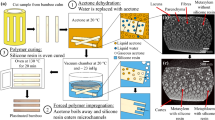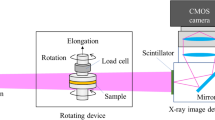Abstract
THE initial thickening of slurries of hemi-hydrate type gypsum plasters has been considered by many workers to be due to a colloidal mechanism, whereas the further hardening and final setting have always been attributed to a crystallization process. Recent work supporting the colloidal theory is that of Fischer1, while still later Becherer and Fiedler2 have attributed the initial thickening of plaster slurries to the action of capillary forces causing a packing together of hemi-hydrate particles.
This is a preview of subscription content, access via your institution
Access options
Subscribe to this journal
Receive 51 print issues and online access
$199.00 per year
only $3.90 per issue
Buy this article
- Purchase on Springer Link
- Instant access to full article PDF
Prices may be subject to local taxes which are calculated during checkout
Similar content being viewed by others
References
Fischer, H. C., A.S.T.M. Bull., No. 192, 43 (Sept. 1953).
Becherer, G., and Fiedler, H., Silikat Technik, 6, 292 (1955).
Standards Association of Australia, Interim. Spec. 317 for Gypsum Plaster Hemi-hydrate Type (Sept. 1949).
Neville, H. A., J. Phys. Chem., 30, 1037 (1926).
Author information
Authors and Affiliations
Rights and permissions
About this article
Cite this article
POWELL, D. Setting of Gypsum Plaster. Nature 178, 428–429 (1956). https://doi.org/10.1038/178428b0
Issue Date:
DOI: https://doi.org/10.1038/178428b0
Comments
By submitting a comment you agree to abide by our Terms and Community Guidelines. If you find something abusive or that does not comply with our terms or guidelines please flag it as inappropriate.



